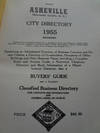![Our Universe: The Known and the Unknown in The American Scholar 37 No. 2 pp. 248-274, Spring 1968 [ FIRST EDITION, ORIGINAL WRAPPERS. WHEELER COINS THE TERM 'BLACK HOLE']](https://d3525k1ryd2155.cloudfront.net/h/869/299/1298299869.0.m.jpg)
Our Universe: The Known and the Unknown in The American Scholar 37 No. 2 pp. 248-274, Spring 1968 [ FIRST EDITION, ORIGINAL WRAPPERS. WHEELER COINS THE TERM 'BLACK HOLE']
by Wheeler, John
- Used
- first
- Condition
- See description
- Seller
-
West Branch, Iowa, United States
Payment Methods Accepted
About This Item
1968. 1st Edition. FIRST EDITION IN ORIGINAL WRAPPERS OF THE 1st PRINTING OF THE JOHN WHEELER'S TERM "BLACK HOLE" - A PLACE IN SPACE WHERE GRAVITY PULLS SO MUCH THAT EVEN LIGHT CANNOT GET OUT. Wheeler first used the appellation in a lecture before the American Association for the Advancement of Science on December 29, 1967. The lecture was published in The American Scholar, offered here; it was also published concurrently in American Scientist. Despite how history has recorded the origin of the term, as Wheeler himself later wrote, the coinage of "black hole" was not entirely his own.
"In the fall of 1967, [I was invited] to a conference ... on pulsars. ... In my talk, I argued that we should consider the possibility that the center of a pulsar is a gravitationally completely collapsed object. I remarked that one couldn't keep saying "gravitationally completely collapsed object" over and over. One needed a shorter descriptive phrase. "How about black hole?" asked someone in the audience. I had been searching for the right term for months, mulling it over in bed, in the bathtub, in my car, whenever I had quiet moments. Suddenly this name seemed exactly right. When I gave a more formal Sigma Xi-Phi Beta Kappa lecture ... on December 29, 1967, I used the term, and then included it in the written version of the lecture published in the spring of 1968. (Wheeler, Geons, Black Holes, and Quantum Foam (2000), 296-297).
"John Archibald Wheeler (1911-2008) was a leading theoretical physicist of the twentieth century, contributing particularly to the fields of general relativity, gravitation, and quantum mechanics. Wheeler was a pioneer in the study of black holes, celestial phenomena which he named. (He had a penchant for creating new terms in physics, and is credited with naming other phenomena such as geons, wormholes, and quantum foam.) Wheeler is also known for his work in atomic and nuclear physics" (John Archibald Wheeler Papers, Linda Hall Library). CONDITION & DETAILS: Original wrappers. [17], 210-378. Very slight fading to the front wrap; one small light spot. Tightly bound and bright and very clean throughout. Near fine condition.
"In the fall of 1967, [I was invited] to a conference ... on pulsars. ... In my talk, I argued that we should consider the possibility that the center of a pulsar is a gravitationally completely collapsed object. I remarked that one couldn't keep saying "gravitationally completely collapsed object" over and over. One needed a shorter descriptive phrase. "How about black hole?" asked someone in the audience. I had been searching for the right term for months, mulling it over in bed, in the bathtub, in my car, whenever I had quiet moments. Suddenly this name seemed exactly right. When I gave a more formal Sigma Xi-Phi Beta Kappa lecture ... on December 29, 1967, I used the term, and then included it in the written version of the lecture published in the spring of 1968. (Wheeler, Geons, Black Holes, and Quantum Foam (2000), 296-297).
"John Archibald Wheeler (1911-2008) was a leading theoretical physicist of the twentieth century, contributing particularly to the fields of general relativity, gravitation, and quantum mechanics. Wheeler was a pioneer in the study of black holes, celestial phenomena which he named. (He had a penchant for creating new terms in physics, and is credited with naming other phenomena such as geons, wormholes, and quantum foam.) Wheeler is also known for his work in atomic and nuclear physics" (John Archibald Wheeler Papers, Linda Hall Library). CONDITION & DETAILS: Original wrappers. [17], 210-378. Very slight fading to the front wrap; one small light spot. Tightly bound and bright and very clean throughout. Near fine condition.
Reviews
(Log in or Create an Account first!)
Details
- Bookseller
- Atticus Rare Books
(US)
- Bookseller's Inventory #
- 1378
- Title
- Our Universe: The Known and the Unknown in The American Scholar 37 No. 2 pp. 248-274, Spring 1968 [ FIRST EDITION, ORIGINAL WRAPPERS. WHEELER COINS THE TERM 'BLACK HOLE']
- Author
- Wheeler, John
- Book Condition
- Used
- Quantity Available
- 1
- Edition
- 1st Edition
- Date Published
- 1968
Terms of Sale
Atticus Rare Books
30 day return guarantee, with full refund including shipping costs for up to 30 days after delivery if an item arrives misdescribed or damaged.
About the Seller
Atticus Rare Books
Biblio member since 2010
West Branch, Iowa
About Atticus Rare Books
We specialize in rare and unusual antiquarian books in the sciences and the history of science. Additionally, we specialize in 20th century physics, mathematics, and astronomy.
Glossary
Some terminology that may be used in this description includes:
- New
- A new book is a book previously not circulated to a buyer. Although a new book is typically free of any faults or defects, "new"...
- Fine
- A book in fine condition exhibits no flaws. A fine condition book closely approaches As New condition, but may lack the...
- First Edition
- In book collecting, the first edition is the earliest published form of a book. A book may have more than one first edition in...
- Wrappers
- The paper covering on the outside of a paperback. Also see the entry for pictorial wraps, color illustrated coverings for...

